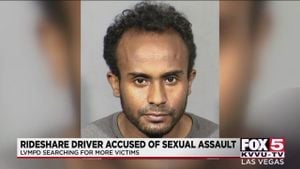Tesla's stock has recently experienced a significant surge, climbing as much as 8% on reports stating the Trump administration is preparing to ease regulations concerning self-driving cars after Donald Trump's election victory. The anticipated changes primarily focus on creating a new federal regulation framework for autonomous vehicles (AV), which aligns well with Tesla's long-term strategic plans. This potential shift marks a stark turnaround from Trump's previous statements, where he expressed concerns about the safety and efficacy of AVs, indicating he would stop them from operating on American roads.<\/p>
Bloomberg News reported on Monday, citing inside sources from the president-elect's transition team, noted the Department of Transportation's plans to formulate federal regulations aimed at supporting the deployment of AV technologies. Currently, the existing federal rules pose challenges for companies like Tesla, which is on the brink of launching its futuristic Cybercab - an all-electric, fully autonomous vehicle without steering wheels or pedals. Such innovations could drastically reshape transportation, making it more reliant on technology and less on human intervention.
Elon Musk, Tesla's CEO, has not remained silent on the issue. Musk has actively lobbied for favorable regulations since Trump's first election, contributing significant dollars to Trump's campaigns, and attending strategic meetings as his role as Trump’s close advisor grows. His advocacy for self-driving technology could potentially pave the way for Tesla's dominance within the growing AV market, which is projected to be worth over $1 trillion.
Recent gains have positioned Tesla as more than just another automotive player; it now stands out as potentially the most valuable car manufacturer globally, eclipsing traditional rivals like Ford and General Motors. After Trump's victory, Tesla’s market capitalization soared back above the $1 trillion mark, reflecting investor optimism about the future under the Trump administration. Market analysts, like Dan Ives from Wedbush, perceive Musk’s connections and influence as significant, believing they will serve to alleviate the regulatory burdens on Tesla and assist the company’s ambitions to introduce more autonomous vehicles.
The push for self-driving cars has been part of Musk's vision for Tesla ever since he announced his intention to develop robotaxis—self-driving cars positioned for ride-sharing applications. Despite having encountered numerous developmental delays, Musk remains optimistic, claiming the Cybercab will enter mass production as early as 2027. Analysts predict the reformation of regulatory oversight could lead to faster approvals for such innovations.
Looking back at how Tesla's stock has fared post-election, Musk’s political ties seem to have borne fruit, allowing for rapid stock gains. With the prospect of federal legislation simplifying the regulatory environment, Tesla shares reflect the growing investor faith who anticipate Musk moving forward with his ambitious plans for driverless cars. Several analysts project Tesla’s share price could reach $400 per share within the next 12 to 18 months, fueled by expectations of accelerated production timelines for its AV technology.
Some industry experts, like David Sacks, highlight how Musk’s strengthened political relationships could nullify regulatory threats from agencies like the National Highway Traffic Safety Administration (NHTSA). This anticipation of de-escalated regulatory scrutiny has helped shift the market sentiment surrounding Tesla's capabilities compared to its peers.
It's notable to also observe the broader automotive sector's struggles as Tesla's aspirations thrive. While traditional carmakers grapple with high costs, tariffs, and fluctuatory sales, Tesla has positioned itself firmly at the forefront of the EV revolution. With existing federal rules prohibiting the large-scale deployment of fully autonomous vehicles, the anticipated easing of regulations offers much hope to not only Tesla but also to potential competitors wishing to join the market.
Despite all the optimism, the future remains uncertain—especially amid potential challenges related to tariffs and international trade. Musk's ambitious plan to launch rideshare services remains contingent not only on regulatory support but also on overcoming competitive pressure from traditional manufacturers and new players alike. Musk remains hopeful though, clearly favoring the national approach to AV regulations.
Reports have surfaced indicating bipartisan discussions are underway to draft new legislation surrounding AV regulations. Any reform would signal significant progress, allowing broader access to autonomous technology across the retail automotive space. Currently, there are over 19 states with laws permitting self-driving cars to operate on public roads; this piecemeal regulatory approach has caused difficulties and confusion across various jurisdictions.
Therefore, with innovations surrounding the Cybercab and Musk's continuous push for improved regulations, it will be fascinating to see how quickly Tesla can capitalize on this changing political and regulatory environment. What does remain concerning is the specter of corruption and cronyism; critics have noted the troubling potential for political favoritism to unduly influence regulatory policies directly benefiting large corporations like Tesla. Amidst these concerns, many stakeholders will closely monitor Musk’s growing influence within the Trump administration as the changes begin to materialize.
While the potential for self-driving vehicles draws considerable interest and optimistic projections suggest the market for them could surge, the actual performance and consumer acceptance of these technologies remain key unknowns. There will undoubtedly be hurdles along the way, but with Musk’s considerable resources and connections, he appears well-positioned to navigate these challenges. The relationship between political maneuvers and the innovative tech narrative will continue to evolve, and how it impacts the future of transportation will be something to keep one’s eye on.



